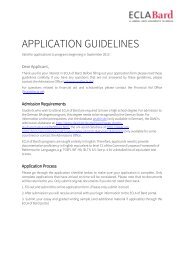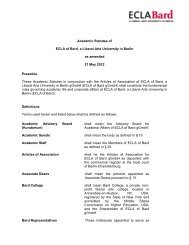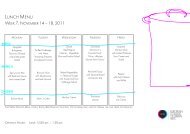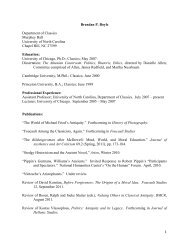Create successful ePaper yourself
Turn your PDF publications into a flip-book with our unique Google optimized e-Paper software.
PRESS RELEASE<br />
The First BA in Value Studies<br />
And a New European Approach to Liberal Education<br />
In October <strong>2009</strong> the European College of Liberal Arts (in <strong>Berlin</strong>, Germany) will introduce a 4-year degree<br />
programme leading to a Bachelor of Arts in Value Studies. This programme, the first of its kind worldwide, represents<br />
a new European approach to liberal education.<br />
In Europe, it is common for general education to take place in high school, while the years in higher education are<br />
dedicated to single-minded vocational or disciplinary training. It is not clear, however, that this system serves us well.<br />
In an age when technological progress is miles ahead of our general conceptual abilities, and when our global<br />
institution-building is far too crude for us to meet the political, economic and cultural challenges we are confronted<br />
with, it is time to improve our level of general education. Specialization is no doubt a necessary element in higher<br />
education, but it can no longer seriously be considered sufficient. We need young people who can see the<br />
connections between the expertise by which they make their livings and the larger concerns of mankind. And we need<br />
to change the mindset which discourages curious and ambitious young people from spending time on the only kind of<br />
education which can prepare them to address these concerns. To close the current gaps, we should (among other<br />
things) strengthen the level of general education both in our high schools and in higher education.<br />
To serve this end, the European College of Liberal Arts has been created as a college without departments,<br />
dedicated to the integrated study of values. A young faculty, recruited from some of the best research universities in<br />
the world, has designed the BA in Value Studies for students who want to combine their pursuit of special interests with<br />
a demanding studium generale. In every part of the BA programme, students work with faculty from different<br />
backgrounds on moral, political, epistemic, religious, and aesthetic questions, with the understanding that such<br />
questions are naturally and deeply connected. Students spend half of their classroom time in a 'core course' devoted<br />
to fundamental questions about values, addressed through the close study of texts and works of art that have shaped,<br />
or seek to shape, the values we live by today. Against this background students choose two out of three possible<br />
areas of concentration: Art & Aesthetics, Literature & Rhetoric, Ethics & Political Theory. In this manner the BA<br />
programme is designed to provide not only a very high level of general education, but also excellent support for<br />
students interested in careers in politics, organizational work, public policy, law, journalism, or the art world. The<br />
programme also prepares students for continued study in academic disciplines such as philosophy, literature, political<br />
theory, and art history.<br />
The ideals of liberal education have their origin in the European intellectual tradition. In the 20 th century, however,<br />
these ideals have been upheld, at least in higher education, mainly in the United States, where the two most common<br />
models of liberal education are the great books programme and the distribution requirement model. Instead of simply<br />
adopting one of these existing models, <strong>ECLA</strong> has chosen a more ambitious route. Through a series of curricular<br />
experiments that began in 2002, <strong>ECLA</strong> faculty have reformulated the classical ideals and developed a new 'value<br />
questions' approach to liberal education. The first premise of this approach is that questions about values have a predisciplinary<br />
claim on all of us: we discuss questions about justice, beauty, truth and other values around the dinner<br />
table with family and friends long before we go to universities. Placing such questions at the centre of a university<br />
<strong>ECLA</strong> gGmbH, Platanenstr. 24, 13156 <strong>Berlin</strong>, phone: +49 (0)30 43733 0, fax: +49 (0)30 43733 100, info@ecla.de, www.ecla.de, Hypovereinsbank: blz 700 202 70, kto 2 485 818<br />
HRB Charlottenburg 84001, Geschäftsführung: Peter Hajnal, Thomas Nørgaard
curriculum is unusual, but has many advantages. An ongoing concern with value questions results in academic training<br />
that is not merely academic, but relevant far beyond academia. A curriculum focused on value questions allows<br />
academics from many different backgrounds to work together with a shared sense of purpose. It promises a better<br />
integrated liberal education than the distribution requirement model, and is more flexible than the great books<br />
programme. It is also an approach that invites dialogue between different cultural and political commitments, and<br />
reflection on the relation between theory and practice. Most importantly, perhaps, the value questions approach<br />
educates the student not just as a future worker, but as a person and citizen. Good value questions always engage<br />
and challenge us personally. And the dialogues such questions inspire are, ultimately, ongoing explorations of the<br />
extent to which we can find common normative ground for shared lives. As Plato's Socrates observed, disagreement<br />
about values is a source of anger and enmity. By addressing value questions together, <strong>ECLA</strong> students educate<br />
themselves to inhabit a common world.<br />
<strong>ECLA</strong> is a private, non-profit institution of higher education. The college has been running an International Summer<br />
University since 2000 and one-year programmes since 2002. The BA programme in Value Studies is the next big<br />
step in a project that is meant to put liberal arts back on the educational map of Europe.<br />
<strong>ECLA</strong> has no religious or political affiliations. The college is supported by a philanthropic grant from the Christian A.<br />
Johnson Endeavour Foundation in New York that makes it possible to maintain a need-blind admissions policy and a<br />
world-class faculty student ratio of 1:7. Most of the teaching is organized around small discussion seminars and oneto-one<br />
tutorials in the Oxbridge style. Students and faculty come from all over the world and work together in English.<br />
Students live and study together on a small residential campus created around 8 renovated former GDR embassies in<br />
<strong>Berlin</strong>.<br />
<strong>ECLA</strong> co-operates fruitfully with several other institutions of higher education, most importantly Bennington College in<br />
Vermont, Bard College in New York, and Bucerius Law School in Hamburg.<br />
For more information about <strong>ECLA</strong>, please consult www.ecla.de<br />
To schedule a campus visit or an interview, please contact:<br />
Fiona Schnüttgen<br />
Platanenstr 24<br />
13156 <strong>Berlin</strong><br />
Germany<br />
Telephone: +49 30 43 733 0<br />
Email: f.schnuettgen@ecla.de<br />
<strong>ECLA</strong> gGmbH, Platanenstr. 24, 13156 <strong>Berlin</strong>, phone: +49 (0)30 43733 0, fax: +49 (0)30 43733 100, info@ecla.de, www.ecla.de, Hypovereinsbank: blz 700 202 70, kto 2 485 818<br />
HRB Charlottenburg 84001, Geschäftsführung: Peter Hajnal, Thomas Nørgaard








